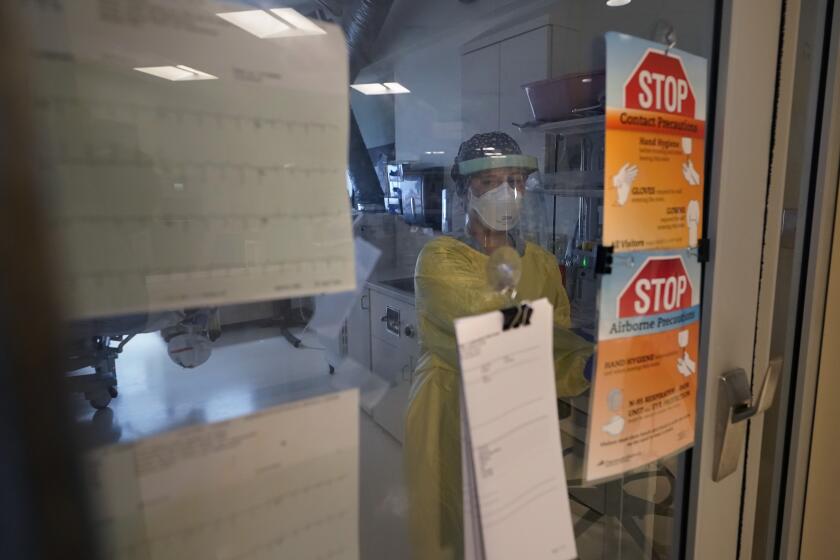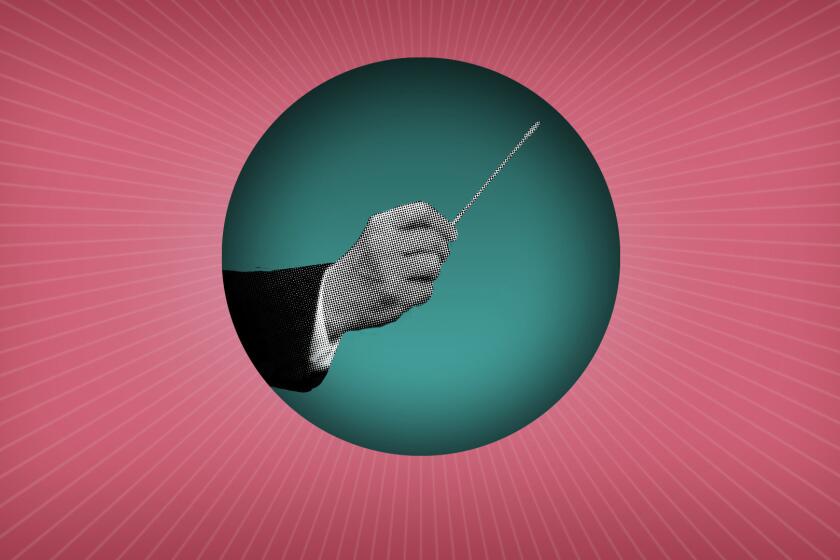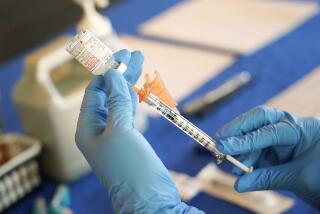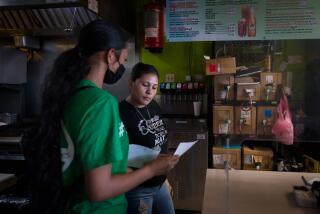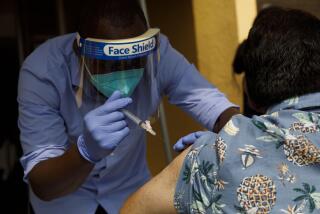Still have questions about COVID-19 vaccines? This nurse has answers
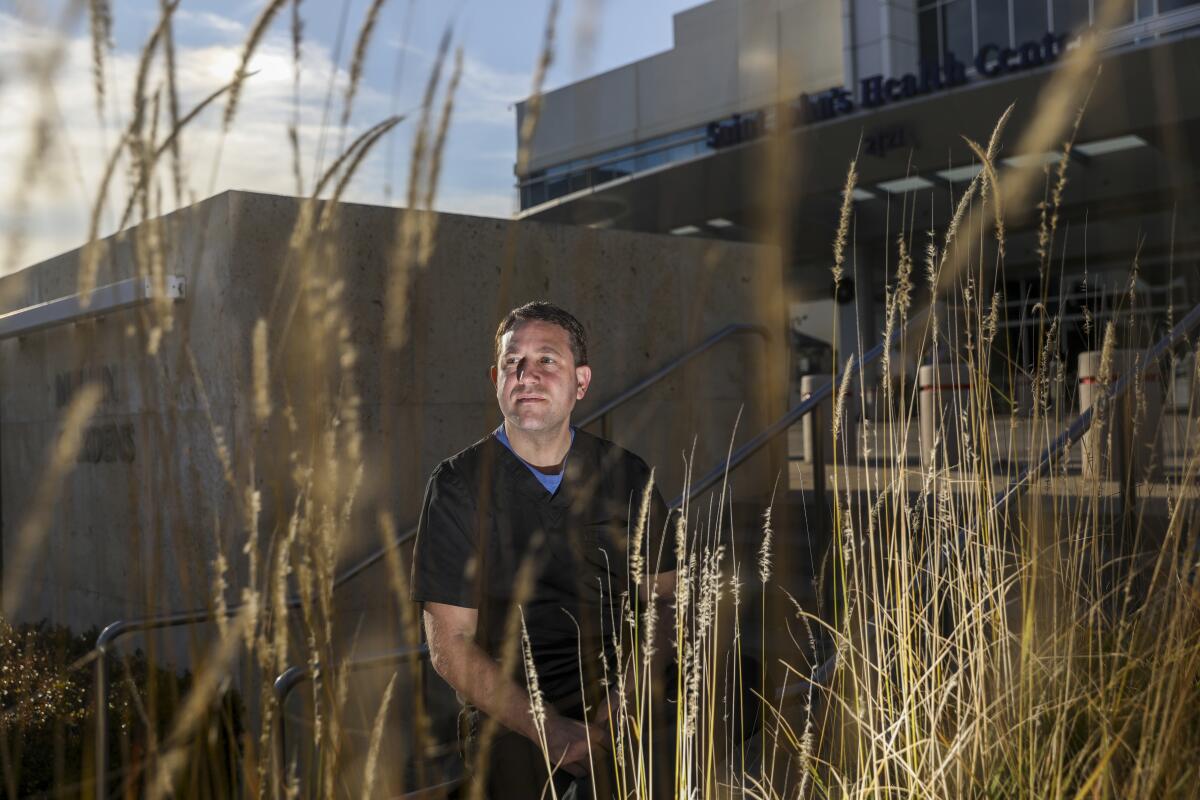
- Share via
Let’s say you’re not sure it’s safe for your kids to get vaccinated against COVID-19, or for you to get on a plane.
He can help you make an informed decision.
Let’s say you know someone who had a scary side effect, so you’re still not ready to get a shot.
He can tell you the math on risks and benefits.
Let’s say you wonder if you need to get boosted, given that the Omicron variant appears to be less lethal than others.
He’s your guy.
Boaz Hepner, a registered nurse, didn’t set out to be a one-man clearinghouse of information on the coronavirus and the vaccines developed to fight it. But as he learned more, he shared more, and his audience grew. He has now counseled neighbors, family, friends and colleagues at Providence Saint John’s Health Center in Santa Monica.
“When the pandemic started, I was working at the hospital with COVID patients and everybody was scared,” said Hepner, who decided to take advantage of his access to experts and his role as a contributor to the Jewish Journal.
Hospitalizations of U.S. children under 5 with COVID-19 have soared, a worrisome trend in youngsters too young to be vaccinated.
Lakshmy Menon, an infection prevention specialist at Saint John’s and former Centers for Disease Control and Prevention scientist, became one of Hepner’s go-to sources in the early stages of the pandemic. She was the subject of a story he wrote for the Jewish Journal in March 2020.
“He’s really filled a gap,” said Menon, who told me various professionals at any hospital can answer questions about COVID-19 and the vaccines, but they’re not necessarily easily accessible to everyone. “It was such a blessing for Boaz to take an interest and put all the knowledge together and educate his peers. By the force of his personality, his peers trust him and patients trust him.”
Another colleague Hepner peppered with questions was Dr. Ellie Goldstein, an infectious-disease specialist at Saint John’s.
“He’s a really good nurse, and he took on this extra thing to try to raise the level of awareness and understanding,” Goldstein said. Hepner’s objective, he added, is “to combat misinformation that people might have. Really, I think his strength is addressing people’s questions and their fears.”
Nobody who knows Hepner is surprised by how committed he is to his latest mission, and when I heard about his work as a vaccine educator, neither was I. I wrote about Hepner in 2010, when he took on City Hall and organized his community in a relentless one-year battle to get more trash cans in his Pico-Robertson neighborhood.
“Oh my God, it’s the hero of the city!” a merchant said when I walked into a store with Hepner after the trash cans were in place. “Do you know the streets are cleaner because of him?”
Hepner has taken on a bigger cause now, and it’s not an exaggeration to say a lot of people are better informed because of him. Hepner said he takes an apolitical approach with patients, readers, friends and colleagues who ask him questions. By his tally, most of the vaccine-hesitant people he’s counseled decided to get jabbed after hearing him out, including medical personnel.
Hanna Yemanebirhan, a nurse colleague of Hepner’s, told me she survived the first big waves of COVID-19 patients without getting sick and didn’t see a need to get vaccinated. She changed her mind after talking to Hepner.
“He really made me think more about it,” said Yemanebirhan, who told me no one else had taken as much time to help her sort through the benefits and risks of the vaccine. “I trust Boaz. He’s a very open and caring person.”
Jason Rosenbaum, a longtime friend of Hepner’s, is vaccinated but was apprehensive about getting a booster and taking his 5-year-old daughter in for her first vaccination. Both tested positive for the virus last year, and Rosenbaum had questions about whether he needed a booster, as well as whether there was enough data yet to suggest vaccines are safe for young children.
“Boaz was there for me,” Rosenbaum said. “I probably drove him crazy with all my various questions, and I attended one of his webinars. … On the things Boaz is passionate about, he’s all in.”
Rosenbaum said he decided on getting the shots after determining, thanks in part to Hepner’s research, that the risks of acute side effects were minute, and that the risks of getting COVID-19 were far greater.
“It’s better to hedge your bet on the vaccine,” Rosenbaum said.
Dr. Ronald A. Nagel, a pediatrician at Cedars-Sinai Medical Center, said he didn’t necessarily learn anything new from Hepner, who has shared his research virtually and in person, with seminars that run as long as two hours plus. (One of Hepner’s presentations can be found on YouTube.)
“But Boaz put it all together” in a way that was so compelling, Nagel said, that he has drawn from Hepner’s presentation in answering questions from vaccine-hesitant parents.
“I use quite a bit of the information he had,” Nagel said, particularly when he’s asked how vaccines that were developed so quickly can be safe.
Nagel said Hepner explained that mRNA vaccines developed by Pfizer and Moderna used science that has been researched for various uses going back many years. Although it typically takes many years to develop vaccines, Nagel said, during the pandemic the drug companies had the advantage of then-President Trump’s call to move quickly, with ample funding, plenty of scientists joining the cause, thousands of willing trial participants, and no shortage of virus on which to test the vaccines.
We still don’t know everything there is to know about the virus or the vaccines, Nagel said.
“But I’m more nervous about the disease than the vaccine,” he said. “This disease scares me.”
Symptoms of common colds, the flu and COVID-19 can overlap, so experts say testing is the best way to determine which of those you have.
Hepner told me his 3½-year-old daughter is in a vaccine trial, and that he is the COVID-19 advisor to her preschool, where the students are masked and the parents and staff are vaccinated. He said he has eaten at restaurants, but only outdoors. He has been to the movies, but kept a mask on the whole time, and he has not been on a plane.
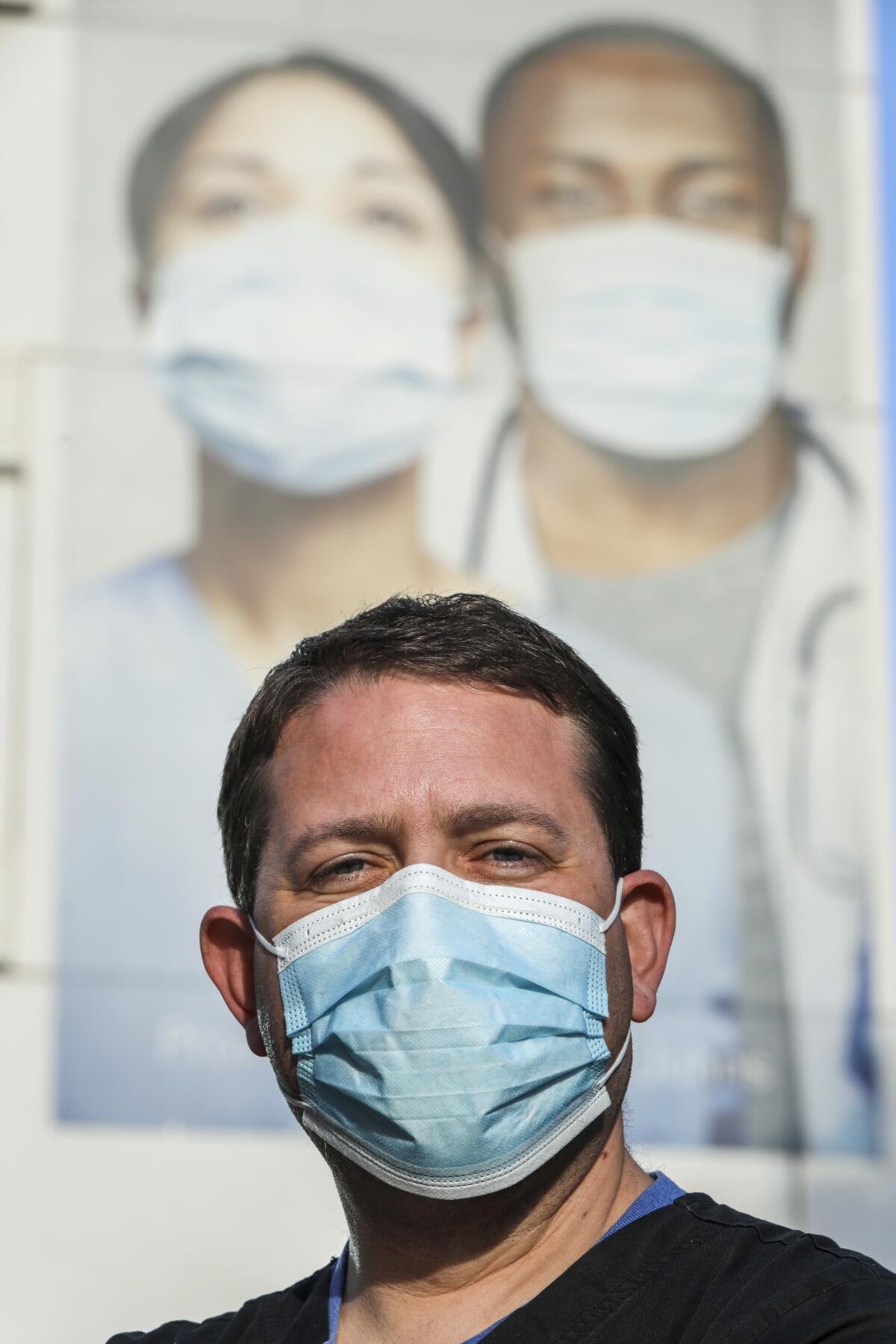
“I’d do it, but I’d wear an N95 mask, and I wouldn’t take it off to eat,” Hepner said.
Recently, an unvaccinated patient and her husband asked him why they should bother getting a shot if there are so many breakthrough infections, particularly with the Omicron variant that’s now stressing hospitals around the country. Hepner doesn’t know if they eventually got vaccinated.
But he told them that while early indications are that Omicron is less lethal and has less severe symptoms, that’s not always the case. It’s more highly contagious, he said, which means more people will be exposed to potential acute symptoms.
Vaccines are not 100% effective, Hepner said. But they lower the chance of getting the virus, and if you get it anyway, statistically speaking, the effects are less severe.
“We have to understand that it’s not just about prevention,” Hepner said. “It’s about mitigating the risk.”
Two years into an exhausting and scary pandemic, that’s good advice for everyone.
steve.lopez@latimes.com
More to Read
Sign up for Essential California
The most important California stories and recommendations in your inbox every morning.
You may occasionally receive promotional content from the Los Angeles Times.

